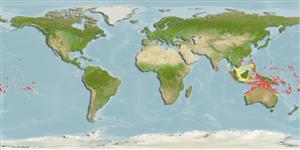>
Eupercaria/misc (Various families in series Eupercaria) >
Labridae (Wrasses) > Corinae
Etymology: Halichoeres: Greek, als, alis = salt + Greek, choiros = pig (Ref. 45335).
More on author: Randall.
Environment: milieu / climate zone / depth range / distribution range
Ecologia
marinhas associadas(os) a recifes; intervalo de profundidade 10 - 56 m (Ref. 90102), usually 33 - ? m (Ref. 1602). Tropical; 19°N - 25°S
Indo-Pacific: Cocos-Keeling Island and Rowley Shoals in the eastern Indian Ocean to the Marquesas and Pitcairn islands.
Tamanho / Peso / Idade
Maturity: Lm ? range ? - ? cm
Max length : 24.0 cm TL macho/indeterminado; (Ref. 9710)
Descrição suscinta
Chaves de identificação | Morfologia | Morfometria
Espinhos dorsais (total) : 9; Raios dorsais (total) : 12; Espinhos anais: 3; Raios anais : 12; Vértebras: 25. Fresh male specimens reddish brown dorsally, reddish ventrally; head with green bands; upper opercle with a large blue-edged black spot, rimmed with blue and red; 3 succession of spots behind eye. Large females may be similar in color with males but with a black spot on branched caudal rays; smaller ones have 3 black spots on dorsal fin base. Anterior lateral line scales with 2-7 pores, more in larger adults; 9-13 suborbital pores. Pelvic fins reaching or nearly reaching anus in large adults.
Common around patches of rubble or mixed rubble and coral along steep drop-offs (Ref. 1602) at 10-56 m depth (Ref. 90102). Feeds on benthic invertebrates (Ref. 89972).
Ciclo de vida ou comportamento de acasalamento
Maturities | Reprodução | Spawnings | Egg(s) | Fecundities | Larvas
Distinct pairing during breeding (Ref. 205).
Randall, J.E., G.R. Allen and R.C. Steene, 1990. Fishes of the Great Barrier Reef and Coral Sea. University of Hawaii Press, Honolulu, Hawaii. 506 p. (Ref. 2334)
Status na Lista Vermelha da UICN (Ref. 130435)
Ameaça para os humanos
Harmless
Uso pelos humanos
Pescarias: espécies comerciais; Aquário: Espécies comerciais
Ferramentas
Relatórios especiais
Baixar XML
Fontes da internet
Estimates based on models
Preferred temperature (Ref.
123201): 25.1 - 28.3, mean 26.8 °C (based on 10 cells).
Índice de diversidade filogenética (Ref.
82804): PD
50 = 0.5000 [Uniqueness, from 0.5 = low to 2.0 = high].
Bayesian length-weight: a=0.00955 (0.00451 - 0.02020), b=3.09 (2.92 - 3.26), in cm total length, based on LWR estimates for this Genus-body shape (Ref.
93245).
Nível Trófico (Ref.
69278): 3.5 ±0.37 se; based on food items.
Resiliência (Ref.
120179): médio(a), tempo mínimo de duplicação da população 1,4 - 4,4 anos (Preliminary K or Fecundity.).
Fishing Vulnerability (Ref.
59153): Low vulnerability (14 of 100).
Nutrients (Ref.
124155): Calcium = 60.6 [37.2, 98.8] mg/100g; Iron = 0.627 [0.374, 1.125] mg/100g; Protein = 18.5 [15.7, 20.7] %; Omega3 = 0.155 [0.104, 0.230] g/100g; Selenium = 28.7 [18.1, 48.5] μg/100g; VitaminA = 121 [38, 433] μg/100g; Zinc = 1.46 [1.04, 2.25] mg/100g (wet weight);
